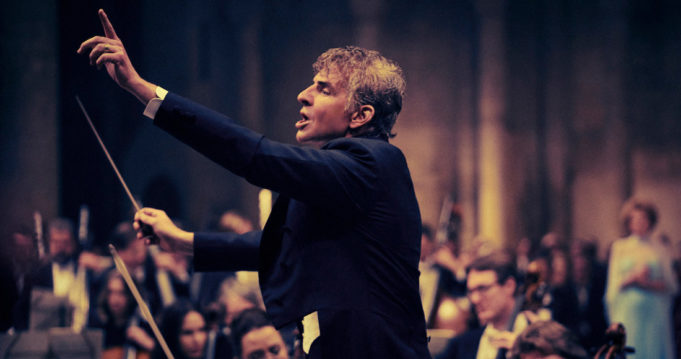And now, an apocryphal story about Leonard Bernstein. Some 40 years ago, he conducted a Mozart piece at the Grammy Awards ceremony, and after finishing his performance, he left the stage and retook his seat in the auditorium — just in time to catch Aerosmith in their 1980s pomp. From the seat next to him, his young male companion of the moment couldn’t help but stare at him. What could the great classical musician possibly be making of “Dude Looks Like a Lady” ? As if Bernstein had read his mind, he turned to the young man and said, “In the end, it’s all just music.”
Whether that actually happened or not, “it’s all just music” was emblematic of Bernstein’s democratic attitude toward his profession. The man had a near-mystical understanding of symphonic scores, but he didn’t carry himself like a mystic. Rather, he was unabashedly showbiz. At a time when the classical music establishment prized difficulty, Bernstein did everything to make it easier, with his TV programs aimed at educating kids about music. His concerts gave audiences an erotic charge — he famously said he couldn’t conduct a piece of music unless it gave him an orgasm. He knew the atonal composers but declared he would rather listen to the Beatles at a time when it required real courage for a serious musician to say that. Among midcentury Americans (especially Jews), this elfin, proudly Jewish composer of much music in Hebrew or Yiddish was a prince, a conductor who could throw down with the best Europe had to offer, who made Old World culture come alive like few others but had no fear of new musics like jazz, salsa, and rock.
It’s hard being married to a man who’s constantly jetting off to far corners of the world to conduct orchestras. It’s also hard being married to a man who’s constantly seeking out sex with younger men. Maybe hardest of all is knowing that the world expects your own creative endeavors to come a distant third to your husband’s career and the raising of your children, and so it was for the Chilean stage actress Felicia Montealegre-Bernstein, which is the fulcrum of Maestro, Bradley Cooper’s electrifying biography of the complicated Bernstein family.
The story runs through the highlights of Bernstein’s life, and, unlike Napoleon, it doesn’t feel rushed or perfunctory. Cinematographer Matthew Libatique starts out filming this in crisp black-and-white and then switches to saturated color when the story hits the 1970s. I’m surprised the film does not re-create Bernstein’s TV specials for CBS in which he explained the basics of classical music — and arguably reached even more people than his concert recordings — and Bernstein regarded himself as an educator as much as anything else.
Making up for that is a dance number when Felicia (Carey Mulligan) hears classical music people counsel Leonard (Cooper) to give up musical theater to concentrate on conducting and asks what his theater music is like. Not only do the couple materialize in an empty theater where a full-dress performance of his ballet Fancy Free is going on. They also end up joining the dancers as the music transitions to his Broadway show On the Town, and Cooper’s dancing ability is only part of the delightful surprise. The choreography is by Justin Peck (fresh from staging Bernstein dances for Spielberg’s West Side Story), and Bernstein’s music is conducted by Yannick Nézet-Séguin. Just hearing the French-Canadian maestro’s renditions through a movie theater’s speakers is worth the price of admission, and Cooper well imitates Bernstein’s rapturous gesticulations on the podium during a remarkable 6-minute-long single take as he conducts Mahler’s “Resurrection” Symphony in a cathedral.
The marriage stuff should pale in comparison to this, but the performances ensure it doesn’t. The role chimes with Cooper’s history of playing driven, ambitious men, as he conveys Leonard’s awareness of his rare set of talents and the pressure he feels to maximize all of them in the time he has. Cooper does well capturing the refined, feminine lilt rounding off his Jewish New York accent, and no less impressive opposite him is Mulligan, whose Felicia is aware from the start about her husband’s homosexuality but still boils over with frustration when she feels elbowed out of his life by the other men.
It’s at Felicia’s behest that Leonard baldfacedly lies about his sexuality to their oldest daughter Jamie (Maya Hawke), but then she explodes at him for not accepting himself while the Macy’s Thanksgiving Day parade goes by the window of their apartment. Then, too, it’s moving when Leonard stands by his wife as she’s struck down by the cancer that will take her life. Maestro ends with Leonard giving an interview about his sense of purpose in his old age, and his affirmation of his joy in life is also a tribute to his wife’s memory. It’s enough to convince you that, as one of his songs said, he found a love that was shining like a harbor light.
Maestro
Starring Bradley Cooper and Carey Mulligan. Directed by Bradley Cooper. Written by Bradley Cooper and Josh Singer. Rated R.












